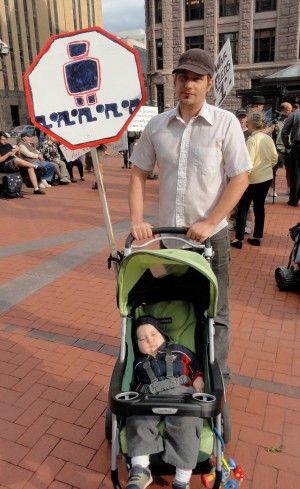OccupyMN’s numbers continue to surge in Minneapolis protests
They came from Blaine, from the Iron Range and across the river from St.
Jul 31, 20202.5K Shares360.2K Views
They came from Blaine, from the Iron Range and across the river from St. Paul. They came with signs, tents and pumpkin chickpea soup, their numbers growing from dozens in the morning to hundreds as afternoon rolled around on the windy Hennepin County Government Center Plaza.
There was little chanting. Instead, participants chatted to one another, and to the dozens of reporters, about corporate influence on politics, America’s wars and the economic divide in this country. But despite the flurry of issues, most agreed that their overarching grievance was one of inequality, as embodied in their slogan: “We are the 99 percent.”
The Occupy Wall Street movement, which has spread to cities across the country in recent weeks, sunk its roots into Minnesota with the start of the Minneapolis occupation Friday. By early afternoon hundreds of people were crowded around organizers, acting as a crude sort of amplification system by repeating the speaker’s words to the hundreds out of earshot.
Image has not been found. URL: http://images.minnesotaindependent.com/chickpea-300x400.jpgPhoto: Donated pumpkin chickpea soup; Source; Jon Collins
Brian VanHout manned the food table packed with boxes of apples, bags of bananas and homemade burritos. “We have no idea what we’re looking at, we’re just rounding up as many resources as we can and just have people on standby,” VanHout said. “We’ve got kitchens across the city with people who are willing and ready to cook.”
One of those likely to benefit from the bags and boxes of donated food was Brandon Chandler, 17, who came from Maplewood with his older brother, Joe Ferley, a University of Minnesota student. The brothers said they were concerned about economic inequalities in the country, and planned to stay through the weekend.
“I think people are really ignorant about how things are run in this country,” Chandler said of the nationwide protest movement. “This could be a little bit of an eye opener,” Chandler said.
Image has not been found. URL: http://images.minnesotaindependent.com/matchbox-300x225.jpgPhoto: Workers from the Matchbox, a collectively-run coffeeshop in Northeast Minneapolis, brought coffee for demonstrators; Source: Jon Collins
Participants ranged in age, race and economic background. Judy Kjenstad, 62, was sitting on the edge of a mostly empty fountain with a sign. She said she’s never attended a protest before, but that she was drawn to the Occupy Minnesota event because of the increasing influence of corporations on American life.
“There doesn’t seem to be anything they don’t touch or influence in our lives. We used to have the Hubert H. Humphrey Metrodome, now we have the Mall of America Field,” Kjenstad said. “We have way too big corporations, banks are too big—we’ve lost community.”
Image has not been found. URL: http://images.minnesotaindependent.com/ows-2360-300x225.jpgPhoto: Judy Kjenstad said she sees hope in the Occupy movement; Source: Jon Collins
Other participants saw lessons to be learned from the past. Bob and Pat Tammen, environmental advocates from Soudan on the Iron Range, were in town for a state hearing on non-ferrous mining permits on private land in northeast Minnesota. Bob Tammen, a retired miner, said he’s noticed a change during his working life as well-paying jobs in the mines disappeared, despite increased productivity.
“One of our neighbor kids went to work for Mesabi Nugget, $12 an hour,” Pat Tammen said. “These are not good paying jobs like years ago, like their dads or their grandfathers [had]—they won’t make a wage like that.”
Both Bob and Pat, a retired teacher, took hits to their retirement funds as Wall Street crashed the economy.
Photo: Phil and Jasper Smith at the Occupy MN protest; Source: Jon Collins
“Our market system failed,” Bob Tammen said. “And it’s not that the whole system has to be done away with, we have to start regulating the system like we did in the ‘30s, we have to have honest regulation and honest public service.”
In the early part of the day, the mood was relaxed and festive. The one slightly combative moment came when one man in Levi’s and a striped shirt began arguing loudly that protesters should not “demonize” the rich, who he said would just move away. “Good,” one protester replied as a flock of local TV news cameramen jockeyed for the shot.
The collaboration of corporate and government interests was a theme among demonstrators. Phil Smith,who was wheeling around his infant son, Jasper, said he was hopeful about the Occupy movement: “It’s exciting to see people say, ‘Hey, we’re sick of this, you’re supporting the banks, the big financial institutions that are getting record profits and everyone else can’t find a job.’”
Image has not been found. URL: http://images.minnesotaindependent.com/ows13-300x400.jpgDavid Lesniaski, a professor at St. Catherine University’s library sciences program, said the Occupy Wall Street movement hasn’t been dominated by the same corporate interests that run the Republican and Democratic parties.
“I’ve lived abroad, I lived in Poland, and I lived and worked in Greece,” Lesniaski said. “And I’ve seen what happens when governments are corrupt, when they respond to monied influences or other influences of power but not to the people, and I don’t want this country to go the way that those two have been going.”

Hajra Shannon
Reviewer
Latest Articles
Popular Articles
